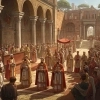Roman Emperor Septimius Severus (193-211 CE)
Septimius Severus: The Architect of Rome's Military Autocracy
Lucius Septimius Severus, better known as Septimius Severus, was a Roman emperor whose reign from 193 to 211 CE marked a significant turning point in the history of the Roman Empire. He rose to power during one of Rome’s most turbulent periods, the "Year of the Five Emperors," and through military strength, political acumen, and ruthless ambition, he established the Severan dynasty, which would rule Rome for nearly half a century. Severus' reign is often seen as the beginning of the transition from the Principate, where emperors ruled in a semblance of cooperation with the Senate, to the Dominate, characterized by a more overtly autocratic and militarized form of governance. His life and reign exemplify the complex dynamics of power, military influence, and the changing nature of the Roman Empire in the late 2nd and early 3rd centuries CE.
Early Life and Rise to Power
Septimius Severus was born on April 11, 145 CE, in the Roman province of Africa, in the city of Leptis Magna (modern-day Libya). He hailed from a wealthy and prominent Punic family of equestrian rank, with distant connections to Roman aristocracy. His father, Publius Septimius Geta, and his mother, Fulvia Pia, were well-connected, and through them, Severus was exposed to Roman culture and education from an early age. His family was affluent enough to provide him with a comprehensive education in Latin and Greek literature, philosophy, and rhetoric, preparing him for a career in public service.
Severus began his public career in Rome under the reign of Emperor Marcus Aurelius, serving as a senator and holding various administrative and military positions across the empire. His early postings included roles in Spain, Sardinia, and Gaul, where he demonstrated his competence and loyalty to the Roman state. Severus quickly gained a reputation as a skilled and ambitious leader, which helped him rise through the ranks of the Roman hierarchy.
During the reign of Emperor Commodus, Severus' career continued to advance, though he wisely kept a low profile during Commodus' increasingly erratic rule. In 191 CE, he was appointed governor of Pannonia Superior, a crucial province on the empire's Danube frontier. This position gave him control over several legions, which would prove vital in his subsequent bid for power.
The Year of the Five Emperors
The death of Commodus on December 31, 192 CE, plunged the Roman Empire into chaos. Commodus had left no heir, and his assassination led to a power struggle that would come to be known as the "Year of the Five Emperors." After Commodus' death, the elderly senator Pertinax was proclaimed emperor by the Senate, but his attempts to reform the state and restore discipline within the Praetorian Guard led to his assassination after only 87 days in power.
Following Pertinax's death, the Praetorian Guard auctioned the empire to the highest bidder, and Didius Julianus won the throne by offering a massive bribe to the guards. However, Julianus' reign was immediately contested by several powerful provincial governors, each commanding significant military forces. Among these contenders was Septimius Severus.
Severus, who was then in command of the legions in Pannonia, was quickly proclaimed emperor by his troops in April 193 CE. Recognizing that his military might gave him a significant advantage, Severus began marching his legions toward Rome. Along the way, he secured the loyalty of other legions, consolidating his power base. Severus' advance was swift, and Didius Julianus, unable to muster effective resistance, was abandoned by the Senate and executed after just 66 days as emperor.
With Julianus out of the way, Severus entered Rome unopposed and was declared emperor by the Senate. However, Severus' position was far from secure. Two other claimants, Pescennius Niger in the East and Clodius Albinus in the West, also sought the imperial throne, leading to a protracted civil war.
Consolidation of Power
Septimius Severus' first major challenge came from Pescennius Niger, the governor of Syria, who had been proclaimed emperor by his legions. Niger commanded a large and experienced army, and his base in the East gave him significant resources. Severus, understanding the threat posed by Niger, moved quickly to confront him. After a series of battles in 194 CE, Severus decisively defeated Niger at the Battle of Issus, a site famously associated with Alexander the Great's victory over Darius III of Persia. Niger was captured and executed, and Severus took control of the eastern provinces, including Syria and Egypt.
Having neutralized the threat from the East, Severus turned his attention to Clodius Albinus, the governor of Britain, who had initially been his ally. To secure Albinus' support during the early stages of his bid for power, Severus had granted him the title of Caesar, effectively making him a co-emperor. However, once Niger was defeated, tensions between Severus and Albinus escalated. Severus, seeking to consolidate his authority, stripped Albinus of his title and declared him a public enemy.
Albinus, in response, declared himself emperor and crossed into Gaul with his legions. The ensuing conflict culminated in the Battle of Lugdunum (modern-day Lyon) in 197 CE, one of the largest and bloodiest battles between Roman forces in the empire's history. Severus emerged victorious, and Albinus was killed in the aftermath. With Albinus' death, Severus was the undisputed ruler of the Roman Empire.
Reforms and Governance
With his rivals defeated, Septimius Severus focused on consolidating his rule and implementing reforms that would strengthen his control over the empire. Severus was acutely aware that his rise to power had been based on military strength, and he sought to ensure that the military would remain loyal to him and his successors. His reign is often characterized by the increased militarization of the Roman state, a trend that would continue under his successors.
One of Severus' most significant reforms was the expansion and reorganization of the Roman army. He increased the number of legions, raising new units to bolster the empire's defenses, particularly along the frontiers. He also increased the pay and benefits for soldiers, ensuring their loyalty. Severus allowed soldiers to marry while in service, a practice that had previously been discouraged, and he improved the legal status of veterans, granting them and their families greater privileges.
Severus also took steps to curtail the power of the Senate, which he viewed as an outdated and ineffective institution. He reduced the Senate's influence over the provinces and centralized authority in the hands of the emperor and the military. Severus relied heavily on the equestrian order (the Roman middle class) for administrative positions, bypassing the traditional senatorial elite. This move further diminished the Senate's power and reinforced the emperor's autocratic rule.
In terms of legal reforms, Severus is known for his efforts to streamline the administration of justice. He appointed jurists like Papinian and Ulpian, who became influential in shaping Roman law. Severus' legal reforms aimed to make the empire's laws more consistent and equitable, reflecting his desire to maintain order and stability.
Severus also undertook significant building projects, both in Rome and throughout the provinces. He renovated the Colosseum, constructed new roads, and expanded the imperial palace on the Palatine Hill. One of his most famous architectural achievements is the Arch of Septimius Severus in the Roman Forum, a monument commemorating his victories in Parthia and his triumphs over his rivals.
Military Campaigns and Expansion
Septimius Severus' reign was marked by significant military campaigns, particularly in the East and in North Africa. After securing his hold on the empire, Severus turned his attention to the Parthian Empire, Rome's longstanding rival in the East. In 197 CE, he launched a major campaign against the Parthians, seeking to expand Roman influence and secure the empire's eastern borders.
Severus' campaign was highly successful. He captured the Parthian capital of Ctesiphon in 198 CE, a major victory that solidified Rome's dominance in the region. However, Severus stopped short of completely annexing Parthia, choosing instead to establish a series of buffer states and vassal kingdoms that would protect the empire's eastern frontiers. His eastern campaign also resulted in the annexation of the northern part of Mesopotamia, which became a new Roman province.
Severus also conducted campaigns in North Africa, where he sought to protect and expand the empire's southern borders. His most notable African campaign was against the Garamantes, a powerful tribe in the Sahara Desert. Severus' forces pushed deep into the desert, extending Roman influence and securing the empire's control over critical trade routes.
Severus' final military campaign took him to Britain, where he sought to strengthen the northern frontier and bring the rebellious Caledonian tribes to heel. In 208 CE, he led a massive military expedition to Britain, accompanied by his sons Caracalla and Geta. Severus advanced deep into Caledonia (modern-day Scotland), building new forts and reinforcing the Hadrian's Wall. However, the harsh climate and difficult terrain took a heavy toll on his army, and the campaign met with mixed success. Severus fell ill during the campaign and returned to Eboracum (modern-day York), where he died on February 4, 211 CE.
Succession and the Severan Dynasty
Before his death, Severus made arrangements for the succession, hoping to secure the future of his dynasty. He declared his two sons, Caracalla and Geta, as co-emperors, hoping they would rule together after his death. However, this arrangement was doomed to fail. Caracalla and Geta had a deeply antagonistic relationship, and after Severus' death, their rivalry quickly escalated into violence.
In December 211 CE, Caracalla ordered the assassination of Geta, who was murdered in the arms of their mother, Julia Domna. Caracalla then embarked on a brutal purge of Geta's supporters, consolidating his power as the sole ruler of the Roman Empire. The murder of Geta and the subsequent purges marked the beginning of a period of instability and internal conflict within the Severan dynasty.
Despite these challenges, the Severan dynasty would continue to rule the Roman Empire for several decades, with varying degrees of success. Caracalla, though ruthless, was a capable ruler who continued his father's policies of military expansion and centralization of power. He is perhaps best known for the Constitutio Antoniniana, a decree issued in 212 CE that granted Roman citizenship to all free inhabitants of the empire, a move that significantly expanded the pool of citizens eligible for taxation and military service.
The Severan dynasty would eventually come to an end with the assassination of Emperor Alexander Severus in 235 CE, marking the beginning of the Crisis of the Third Century, a period of severe instability, civil war, and economic decline that would nearly destroy the Roman Empire.
Legacy of Septimius Severus
Septimius Severus is remembered as one of Rome’s most effective and transformative emperors. His reign marked the beginning of a new era in Roman history, one characterized by increased militarization, centralization of power, and the gradual erosion of the traditional republican institutions that had defined Rome for centuries.
Severus' military reforms laid the groundwork for the empire's defense during a period of increasing external threats. His expansion of the army and improvements in soldiers' conditions helped ensure the loyalty of the military, which became the cornerstone of imperial power. However, these reforms also contributed to the growing divide between the military and civilian populations, and the increasing reliance on the army to maintain order foreshadowed the eventual transformation of the Roman state into a more autocratic and militarized entity.
Severus' legal and administrative reforms also had a lasting impact. The legal scholars he patronized, such as Papinian and Ulpian, played a crucial role in shaping Roman law, which would influence legal systems in Europe and beyond for centuries. His centralization of authority and marginalization of the Senate marked a decisive shift in the balance of power within the Roman state, paving the way for the more autocratic rule of later emperors.
In the realm of foreign policy, Severus' campaigns in the East and in Britain expanded and secured the empire's frontiers, though his efforts to subdue the Caledonian tribes ultimately proved inconclusive. His establishment of new provinces in Mesopotamia and North Africa extended Roman influence and helped secure critical trade routes.
Architecturally, Severus left a lasting mark on Rome and the provinces. His building projects, including the Arch of Septimius Severus in Rome and the expansion of Leptis Magna, reflected his desire to leave a permanent legacy. These monuments stand as testaments to his achievements and his ambition to be remembered as one of Rome's great emperors.
Severus' reign also marked a significant moment in the history of Rome’s relationship with Africa. As the first emperor of African descent, Severus' rise to power underscored the increasingly cosmopolitan nature of the Roman Empire, where provincial elites could rise to the highest levels of power.
Septimius Severus was a complex and formidable figure in Roman history. His rise from a provincial background in North Africa to the imperial throne exemplifies the opportunities and challenges of the Roman Empire in the late 2nd century CE. Through military prowess, political cunning, and a willingness to wield power ruthlessly, Severus secured his place in history as the founder of the Severan dynasty and one of Rome’s most influential emperors.
His reign, while marked by significant achievements, also laid the groundwork for some of the challenges that would confront the Roman Empire in the coming centuries. The increasing militarization of the state, the erosion of traditional republican institutions, and the centralization of power in the hands of the emperor were all trends that would continue to shape the Roman Empire long after Severus' death.
Septimius Severus' legacy is one of both strength and complexity. He was a man who embodied the virtues of military leadership and strategic governance, yet his reign also highlighted the tensions and contradictions that would eventually contribute to the empire's decline. In the end, Severus' story is a reminder of the enduring power of ambition and the far-reaching consequences of leadership in times of change.
Septimius Severus was a formidable military leader who rose from provincial origins to become Emperor of Rome. Born in Leptis Magna, a Roman colony in North Africa, he displayed exceptional military talent and rose through the ranks. His career was marked by successful campaigns and a reputation for ruthlessness. After the chaotic death of Commodus and the brief reigns of Pertinax and Didius Julianus, Severus emerged victorious in a series of civil wars, solidifying his power.
As emperor, Severus implemented significant reforms to restore order and stability to the empire. He reformed the army, increased the size of the Praetorian Guard, and expanded the bureaucracy. His reign also witnessed military campaigns against the Parthians and in Britain, where he built Hadrian's Wall. Despite his successes, Severus' reign was marked by a growing authoritarianism and a focus on dynastic succession, setting the stage for future challenges to the empire.

















Latest




Popular




Useful




